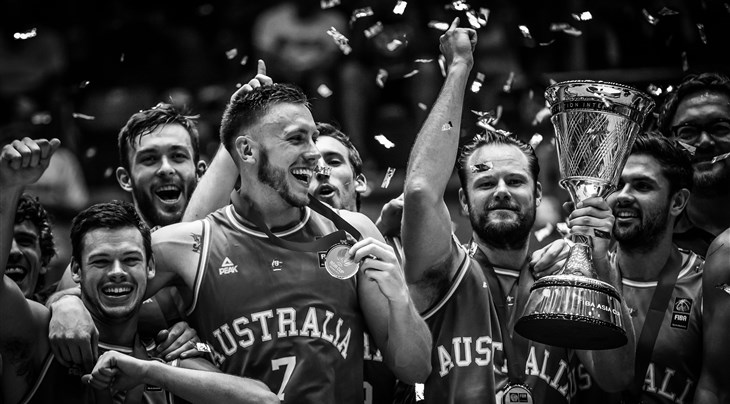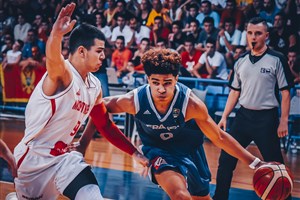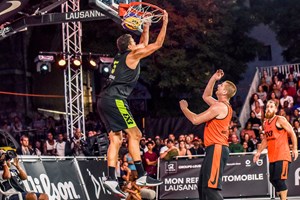
Asia’s finest
MELBOURNE (Paulo Kennedy's View from Downunder) - So just who were Asia's finest after what was a fascinating week-and-a-bit at a new continental frontier in Beirut?
There were some old stars who shone as if time had stood still, some young guns who continued to emerge, so familiar faces who have taken their game to a new level, and some new names from Downunder who signalled they could be stars of Asia for years to come.
The All-Star Five
Centre - Hamed Haddadi (16.2 ppg, 40% FG, 10.8rpg, 6.5apg, 1.8bpg)
The big fella hung around when a number of his long-time running mates had moved on, and his 23-point, 20-rebound double against Lebanon in the quarter-finals was vintage. So was his exquisite passing, and for a man of his size to lead the tournament in assists is surely unheard of.
As good as the ageless one was, his 8-of-27 shooting and 12 turnovers in medal round mean he falls short of tournament MVP in my book, even though he is an absolute no-brainer for the first five.
Power forward - Daniel Kickert (12.3ppg, 44% FG, 40% 3P, 4.7rpg, 3.2apg)
Talk about unassuming and underrated, Daniel Kickert quietly accumulated 43 points, 14 boards and eight assists to three turnovers in the medal rounds, shooting 50 per cent from the field and 6-of-11 from range. Despite playing the four-spot, he was the hub the Australian offence was built around, registering multiple assists in every game.
Kickert was +26 in 21 minutes in gold medal game - with the Boomers outscored when he was on the bench - and when Iran made their run, coach Andrej Lemanis immediately turned to his versatile big man to steady the ship with his experience and leadership.
Small forward - Mitch Creek (14.7ppg, 69% FG, 5.2rpg, 2.3apg)
The tournament MVP in my book. The Boomers dominated teams with their defence, and Creek was instrumental, regularly taking the toughest assignment - including owning Mohammad Jamshidi in the final - and always sparking open-court play with his defensive aggression.
Creek was +120 in 143 minutes, had four games with multiple steals, five games with two or more assists, only one night shooting below 60 per cent, pulled in 1.8 o-boards per game and scored in double figures every game. That’s one hell of an all-around tournament.
Shooting guard - Kim Sunhyung (12.1ppg, 58% FG, 60% 3P, 4.6apg, 3.4rpg, 2.3spg)
He didn't get the headlines but Kim was the driving force behind Korea's impressive and somewhat unexpected success. His ability to score at such a high percentage and also create for others was invaluable, and his disruptive defence was a key behind Korea getting their open-court game going on a regular basis.
There was one quiet game in semi-final against Iran, but his 21 points on 9-of-11 shooting, four assists and three steals blitzed the Philippines in the quarter-finals, and on bronze medal night he was everywhere with 13 points, seven assists, six rebounds and six steals. What an all-court player.
Point guard - Shea Ili (15.4ppg, 48% FG, 5.8apg)
Everyone knew New Zealand had a defensive star in the making last year when Ili hounded both Tony Parker and Cory Joseph at the Olympic Qualifying Tournament. He was strong at that end again in Beirut, but the 24-year-old showed he also knows how to run an offence and deliver big buckets to boot.
He had 14 points and four assists in 18 minutes against Australia before injury struck, finding his way through the Boomers defence when no one else could. Ili’s 19-point, 13-assist display against Jordan in quarter-finals was a masterpiece, as was his 22 points and four dimes against Lebanon and their rabid fans as the Tall Blacks secured a memorable upset.
The best of the rest
Arsalan Kazemi (10.2ppg, 70% FG, 8.2rpg, 3.2apg)
Kazemi only took 33 shots for the tournament, and dished out 19 assists from the four-spot, but he came up big in the medal rounds, tallying 28 points on 10-of-12 shooting, 20 rebounds and five steals, while his defence and rebounding were also crucial to the silver-medal winning effort.
Oh Sekeun (16ppg, 62% FG, 5.7rpg, 1.6spg)
A strong finisher who didn’t drive the Korean bus, but always made sure it was going in the right direction with his efficient scoring. The bank was well and truly open in Beirut.
Finn Delany (12.7ppg, 51% FG, 35% 3P, 7rpg)
With the exception of the semi-final against Australia, Delany was a driving force at both ends with his ability to clear the glass and finish plays, including what was arguably the play of the tournament.
Kevin Galloway (15.3ppg, 35% FG, 9.5rpg, 6.3apg)
While he struggled to put the ball in the hole at an efficient rate, Galloway contributed in every other area and his tireless drive and athleticism were the main reasons Iraq’s return was a competitive one.
Fadi El Khatib (25.9ppg, 46% FG, 5.9rpg, 4.6apg)
Some amazing farewell performances, especially against New Zealand, and had it not been for poor showings against Korea and Iran (a combined 11-of-38 from the field) in big games would have made my all-tournament team, even with his team falling short of the final four.
Mohammad Jamshidi (16ppg, 54% FG, 4.8apg, 3.7rpg, 1.5spg)
Was on track for the All-Star Five but went missing in the final against Mitch Creek and Co, reminiscent of his poor showing against strong opposition at last year’s Olympic qualifier.
Micheal Madanly (20.5ppg, 48% FG, 4.8rpg, 4.3apg, 2spg)
Ten years after he led the tournament with 33.1ppg, Madanly made Syria genuinely competitive at such an important time for his country. His 35 points against China in the final game, on 16-of-26 shooting, was quite remarkable.
Behnam Yakhchali (16ppg, 48% FG, 58% 3P, 4.3rpg, 2.8apg)
Had 21 points on 5-of-8 from range in the semi-final win over Korea, along with 20 points and 10 boards in Iran’s win over Jordan. He wasn’t disgraced in gold medal loss to Australia either, just needed to get more involved for his team to have a chance.
Mitch McCarron (9.8ppg, 62% FG, 8% 3P, 4.3rpg, 1.8orpg)
The game always seemed to change when McCarron checked in with his energy. There were just two games where his plus/minus was lower than his minutes played, and his conversion was outstanding, including shooting 12-of-16 in the knockout rounds
Wael Arakji (16.4ppg, 58% FG, 43% 3P, 4.4rpg, 3.8apg, 2spg)
Take out the New Zealand game, where he was outplayed by Ili, and Arakji averaged 20ppg at 63 per cent and 50 per cent from range, including 24 points, five boards, four assists and four steals in the quarter-final against Iran. That’s a whale of a tournament.
Paulo Kennedy
FIBA
FIBA's columnists write on a wide range of topics relating to basketball that are of interest to them. The opinions they express are their own and in no way reflect those of FIBA.
FIBA takes no responsibility and gives no guarantees, warranties or representations, implied or otherwise, for the content or accuracy of the content and opinion expressed in the above article.

















